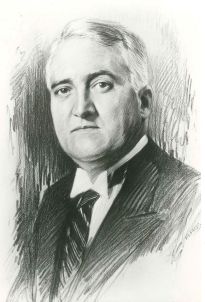Creating a Curricular Foundation in Business and Economics
Business at Illinois Tech has a prestigious history that dates back to the late 1890s, with some of the nation’s first courses in “Home Economics” and “Household Management” (“Family and Consumer Science”) being offered by Lewis Institute in Chicago. In 1926, Lewis Institute formed a Department of Business and Economics and in 1940 merged with Armour Institute to become Illinois Institute of Technology.
Building on earlier pioneering works of Philip D. Armour, a merchant financier, Julia A. Beveridge, a librarian turned public administrator, and Frank W. Gunsaulus, an entrepreneurial preacher in the 1880s, the Department of Business and Economics ultimately grew into a separate school within Illinois Tech—Stuart School of Business—in 1969, with a gift from Lewis Institute alumnus and renowned financier Harold L. Stuart. Stuart himself was a national leader in the field of investment banking in the first half of the twentieth century, and his Chicago investment bank played a pivotal role in establishing the city as a global financial hub.
Through different organizational iterations, over a period of more than 125 years—harnessing curricular innovations by Beveridge and George N. Carman, and incredible scholarly works by trailblazing Illinois Tech scholars Herbert A. Simon (author of Administrative Behavior, later awarded the Nobel Prize in Economics), Karl S. Menger (developer of the St. Petersburg paradox in economics), and Abe Sklar (developer of the Copula in financial modeling)—Stuart School of Business has refined education in the disciplines of economics, finance, analytics, business and public administration, marketing, and management.
First in Finance and Career Readiness
As a long-standing leader in curricular innovation, building on the foundational works of numerous Illinois Tech scholars and Harold Stuart’s own contributions to finance and the broader business community, Stuart School of Business established quantitative finance as an academic discipline. This included, in 1990, offering the world’s first postgraduate master’s program in financial markets and trading—a program that highlighted a new model for embedding an emphasis on career readiness and connectedness with the business community into a postgraduate academic program. This innovative approach has transformed business school education.
Today, Stuart School of Business continues to be a frontier innovator in accredited education, offering academic programs and co-curricular opportunities that place students on the path to self-actualization and career success. Leadership, entrepreneurship, experiential learning, positive societal impact, and close ties to the business community, combined with a human-centered approach to student development, and an unyielding focus on student success, continue to be core pillars at Stuart.
Stuart is accredited by the Association to Advance Collegiate Schools of Business (AACSB)—an accreditation achieved by fewer than 6 percent of business schools worldwide.
Note: Philip D. Armour, Julia A. Beveridge, George N. Carman, Frank W. Gunsaulus, Karl S. Menger, Herbert A. Simon, and Harold L. Stuart are Illinois Institute of Technology Hall of Fame members. Brief bios of each are on the Hall of Fame webpage.



